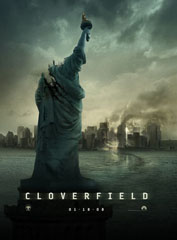
 Cloverfield, like The Blair Witch Project, is a film that's going to divide people. Some people are going to hate both for being overhyped and not living up to their preconceived notions. Some people are going to hate both because they don't get either of them, because neither falls into their limited definition of a science-fiction or horror narrative. Some are going to froth at the mouth and give both films too much credit as the "bestest movie ever" because they're riding the zeitgeist of movie hype too closely and don't have real opinions of their own. Most will just find that the two movies make them motion sick. Because, boy howdy, if you thought Blair Witch was too shaky for you, that was like watching a dull romantic comedy in comparison to Cloverfield.
Cloverfield, like The Blair Witch Project, is a film that's going to divide people. Some people are going to hate both for being overhyped and not living up to their preconceived notions. Some people are going to hate both because they don't get either of them, because neither falls into their limited definition of a science-fiction or horror narrative. Some are going to froth at the mouth and give both films too much credit as the "bestest movie ever" because they're riding the zeitgeist of movie hype too closely and don't have real opinions of their own. Most will just find that the two movies make them motion sick. Because, boy howdy, if you thought Blair Witch was too shaky for you, that was like watching a dull romantic comedy in comparison to Cloverfield.
Now some will probably just heap accolades onto Cloverfield until you're sick of hearing about it, because it happens to fall into their dork niche and they love "Lost" or some shit. Truthfully, the movie is good. Not great, but solidly good. That doesn't mean I'd rush out to watch it again, but, qualitatively, it's a well-crafted film.
There are a few things, immediately, that hold the movie back. This is, ostensibly, a modernization and return to the days of the giant monster movie. The best way for the filmmakers, they thought, to accomplish this is through cinema verite, giving the plot the weight of the struggles of a single group of people and filtering the disaster that befalls Manhattan through their experiences. This, in turn, severely limits the film's premise by roping it into the confines of what the handful of characters can see or surmise on their own, which is never too much.
The movie does a fine job of introducing the various characters through the premise of the film's found footage and all the acting is above par in all cases. The plot works well, though one feels constantly left out of the movie's meta-plot of city destruction, as you're left to follow the few members of a farewell party, trying to escape the island before they're killed. Some will complain about the logic or developments of the film's writing, but they would be retards who just don't understand shit. They'll find a reason to bitch and moan whether or not the movie's brilliant or not.
The visuals are both impressive, intriguing, and hard to watch, making it something of a enigma. Aside from the dizzying and nauseating movement of all the film, it's unusual to have such a big-budget, high-profile movie that hides the effects in an intense amount of camera-shaking and seeing nothing. And it's a very effective technique, to say the least. The audience really is immersed in the movie and the handheld filmmaking technique and you can't help but occassionally catch yourself leaning to one side or another to try to get a better view that doesn't actually change when you move. But, still, it leaves you longing to see more and know fully what's going on. The movie is ripe with questions that are never answered and never seems to give you any shred of the information you long for. But that's the burden of watching a film of "found footage": everything is linear and everything is told from a single perspective.
The film is only one hour and twenty-four minutes, but by the end you're aching for a release from the reeling, dizzying movement, which is a detrement to the film. Though it still feels satisfying, particularly in a day when I'm left to think that any film less than two hours in length is a rip-off at theatrical prices. This movie, though, deserves the big-screen treatment, as you can never tell how well it'll translate to the small screen; will it be easier to watch all the movement in miniature or will all detail be lost on even the biggest HDTV screens?
In the end, it may not be a great film, but it is something amazing and strange to watch and there's something impressive for everyone in the movie's making, if you can get past your motion sickness to find it.


 Blueberry, retitled Renegade in America, is the adaptation of a famous European comic about the Western adventures of a former Confederate who learns to abhor racism and travels the West, becoming involved with the Indian population and righting wrongs.
Blueberry, retitled Renegade in America, is the adaptation of a famous European comic about the Western adventures of a former Confederate who learns to abhor racism and travels the West, becoming involved with the Indian population and righting wrongs.
 Ah, "Reno 911!" Ever the guilty pleasure, I can't get enough of the surreal near-improvised antics of the incompetent Reno Sherrif's Department officers, created and produced by former members of The State.
Ah, "Reno 911!" Ever the guilty pleasure, I can't get enough of the surreal near-improvised antics of the incompetent Reno Sherrif's Department officers, created and produced by former members of The State.
